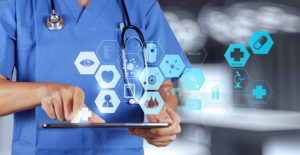In today’s rapidly advancing technological landscape, it’s no surprise that the field of medicine and healthcare is experiencing a transformation. From electronic health records and telemedicine devices and sensors to artificial intelligence and robotics, technology is transforming the way we approach patient care. These innovations are not only improving the speed and accuracy of diagnosis and treatment but also making healthcare more accessible and cost-effective. Join us as we explore the exciting ways in which technology is transforming medicine and healthcare.
The use of applied science in the field of medicine and healthcare has come a long way in recent years, leading to significant improvements in patient care and outcomes. From electronic health records and telemedicine to medical devices and sensors, to artificial intelligence. These innovations are not only improving the speed and accuracy of diagnosis and treatment but also making healthcare more accessible and cost-effective. In this article, we will delve into the various ways in which technology is transforming the field of medicine and healthcare, and the positive impact it is having on patient care.
Leading to significant improvements in patient care and outcomes. Some of the ways in which technology is transforming medicine and healthcare include:
1. Electronic health records (EHRs): EHRs allow healthcare providers to easily access and share patient medical records, which can improve diagnosis and treatment.
2. Telemedicine: Telemedicine enables healthcare providers to remotely diagnose and treat patients using videoconferencing and other digital technologies. This can be especially beneficial for patients in rural areas who may have difficulty accessing in-person care.
3. Medical devices and sensors: Medical devices and sensors, such as wearable fitness trackers and smartwatches, can monitor a patient’s health status and alert healthcare providers to potential issues.
4. Artificial intelligence (AI) and machine learning: Ai and machine learning are being used to analyze large amounts of data and make predictions about patient outcomes, which can help healthcare providers make more informed treatment decisions.
5. Robotics: Robotics is being used in a variety of medical applications, including surgery, rehabilitation, and patient care.
While technology has had a number of positive impacts on the field of medicine and healthcare, it has also introduced some potential threats and challenges. Some of the potential threats of technology in medicine and healthcare include:
1. Cybersecurity: As more and more medical data is digitized and stored electronically, there is a risk of data breaches and cyber-attacks. This could potentially compromise patient privacy and cause harm if sensitive medical information is accessed or used improperly.
2. Dependence on technology: Relying too heavily on technology could potentially lead to a lack of critical thinking and decision-making skills among healthcare providers. It is important for healthcare providers to maintain their clinical judgment and skills, even when utilizing technology.
3. Inequality: Not everyone has equal access to technology, which could potentially lead to healthcare inequality. It is important to ensure that all individuals have access to the benefits of technology in healthcare, regardless of their socio-economic status or location.
4. Privacy concerns: As more and more personal health data is collected and stored digitally, there is a risk that this information could be accessed or used without the patient’s consent. It is important to ensure that appropriate safeguards are in place to protect patient privacy.
Technology has had a remarkable impact on the field of medicine and healthcare, leading to significant improvements in patient care and outcomes. From electronic health records and telemedicine to medical devices and sensors, to artificial intelligence and robotics, technology is revolutionizing the way we approach healthcare. These innovations are not only improving the speed and accuracy of diagnosis and treatment but also making healthcare more accessible and cost-effective. While there are potential risks and challenges associated with the use of technology in healthcare, these can be mitigated through careful planning and the implementation of appropriate safeguards. Overall, technology has the potential to transform the field of medicine and healthcare for the better and will continue to do so in the future.
Overall, the use of technology in medicine and healthcare is helping to improve patient care, increase efficiency, and reduce costs.


